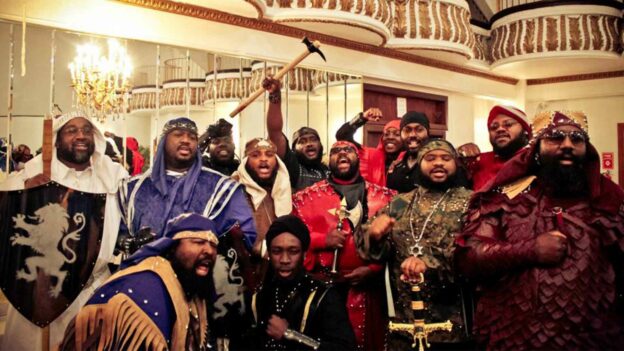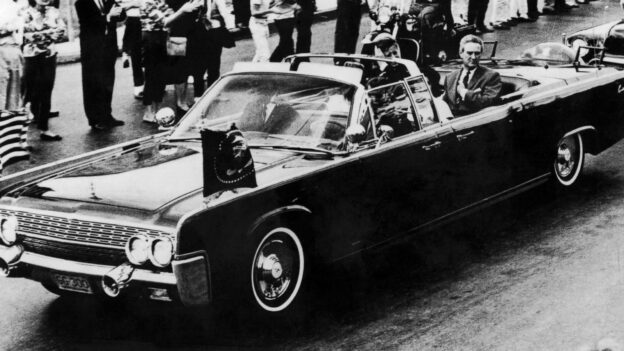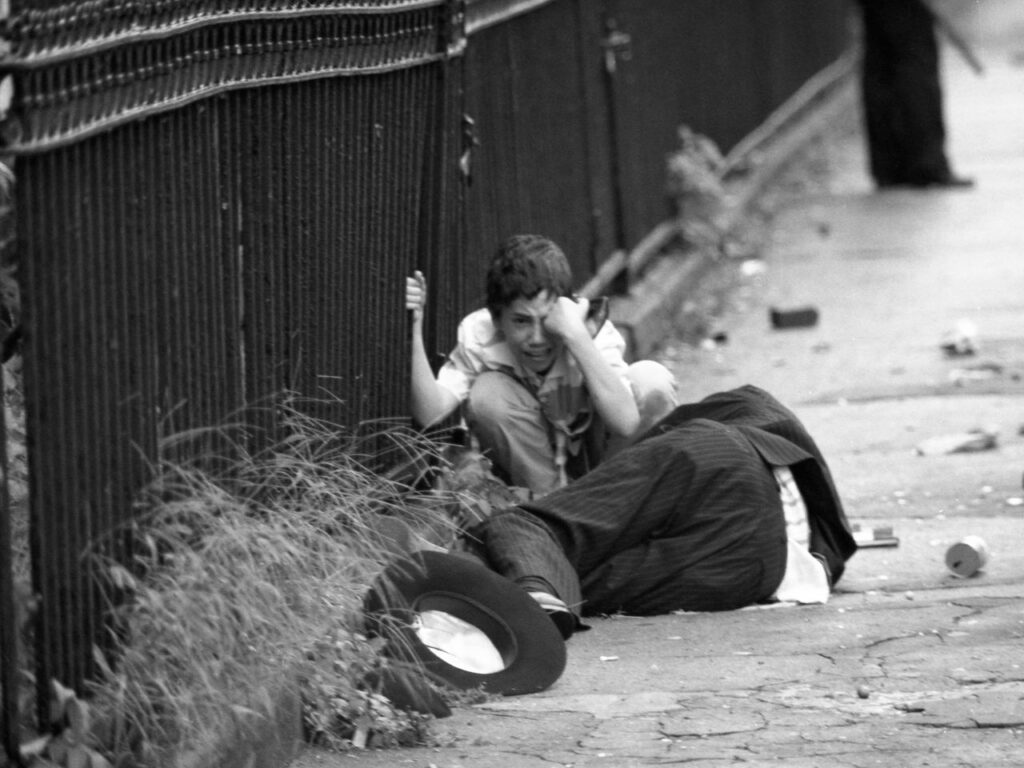There’s no “cure” for either idiocy or anti-Semitism (or the common combination of the two). But there are ways of dealing with it, like calling in the comedians.
To read what I mean, see my most recent Ami Magazine column, here.

There’s no “cure” for either idiocy or anti-Semitism (or the common combination of the two). But there are ways of dealing with it, like calling in the comedians.
To read what I mean, see my most recent Ami Magazine column, here.

“As surely as I have established My covenant with day and night – the laws of heaven and earth – so will I never reject the offspring of Yaakov…” (Yirmiyahu 33:25-26)
There are laws of nature, and of human nature. And one of the latter is, according to Rabi Shimon bar Yochai, in a beraisa brought by Rashi (Beraishis 33:4), the “halacha” that “Esav hates Yaakov.”
When the sar shel Esav wrestles with Yaakov, our forefather asks him “Tell me your name” and Seforno comments that the question’s intent was, “What sin of mine allowed you to attack me?”
No answer to the question is recorded or, presumably, offered.
Something poignant inheres in that. When hatred of Jews is manifest, we often try to understand what begat it, what “reason” there is for it. But, even though the haters might claim there are reasons, when looked at closely, their “reasons” are illogical. There’s simply no “there” there.
Because the hatred isn’t “caused” by anything. It just is, as an expression of animus inherent in Esav’s and his spiritual descendants’ essence.
It is, in other words, a law of human nature. And rather than criticize ourselves for doing this or that wrong, or not doing this or that right, we do best to just smile at the demonstration of that “law,” and, even as we fight, as we must, to counter the unwarranted anger and slanders, try to accept that, at least among some people, it will absurdly persist until Mashiach arrives.
And at the same time, we must recognize, too, that, despite Esav’s evil intentions, another “law,” another reality, is that Hashem “will never reject the offspring of Yaakov,” will never allow Esav and his spiritual progeny to win.
© 2022 Rabbi Avi Shafran

If you aren’t familiar with the story of Roddie Edmonds, a Tennessee-born non-Jewish sergeant who fought in World War II and was captured by the Nazis, you can read it here.

What a bizarre reaction Yaakov has when he first sees Rachel, his wife-to-be: He kisses her and loudly cries. (Beraishis, 29:11).
Stranger still, at least at first read, is one of the explanations the Midrash Rabbah offers (and Rashi quotes) for Yaakov’s tears: “Because he foresaw through Divine inspiration that she would not be buried with him in the cave of Machpelah.”
Not the most romantic reaction, to put it mildly. Sort of a “meet morbid.”
But it shines a blazing light on a major disconnect between how contemporary society views love between husband and wife and how the Torah does.
The disconnect is equally evident in the fact that the seven years that Yaakov worked for Lavan before being granted Rachel as a wife were to him like a mere “few days because of his love for her” (ibid 29:20).
As the Malbim notes, a typical suitor would find having to wait seven years to marry his intended interminable. But Yaakov’s experience was the opposite.
Because he saw his attainment of Rachel as his wife not as a quenching of desire but as a calling, a destiny, a mission of love.
A mission whose very end he foresaw in a prophecy, prompting his tears; and his kiss, which, in Yaakov’s mindset, was the epitome of chaste.
As the Kotzker famously remarked, one who “loves fish” doesn’t really love fish; he loves his palate. The true fish lover is an aquarist.
So many in our world today marry out of self-love, not true love of another. They “fall” in love and thus, so often, “fall out” of love. When the two parts of a new couple see each other as partners in working toward a mutual goal, their marriage becomes not an end of love but rather its nurturing.
© 2022 Rabbi Avi Shafran

Fake, fakery, everything’s phony; I sound like a Bible, I do. Yeah, still young, but I’ve lived long enough to smell the smoke and spot the mirrors. Yeah, me, a phony too. Even after all I’ve given, all I’ve been given, all I seem to be, all they think I am, all the hands stretching out, all the love. Smile, wave, turn, smile. Things aren’t what they seem. They’re the opposite, at least sometimes, at least me… Hero, leader, specimen of manhood and health and confidence. Ha. Wave, smile, turn, wave. If they only knew, if they could only see me at three in the morning writhing in pain, crying like a baby for his mother and a breast but me, for the doc and a shot. Mother… mother. And what about my own kids’ mother… What she knows, my quiet, beautiful wife, she knows. What she doesn’t, she doesn’t have to. Geez, she’s lovely… just like the flowers she’s holding… Even after ten years of marriage… Of course she knows. She just accepts things… the life is just worth it to her, even with me… but she deserves better. She’s suffered enough, with father, with Rose. And the baby, years ago. And the baby now. She doesn’t need more pain dumped on her pile. Let her take some pride in her life, her children. In me, even, even if it’s misplaced… A sham, I am. Even my words aren’t mine. They’re mostly Chaiken’s – ha, Teddy hates it when I call him that. He’s great, though, a brainy tongue. My brainy tongue. It’s him talking, though. I’m just the mannequin moving my mouth, smiling. But a mannequin who screams his own screams at night, who has a “condition.” Ha. Funny word. Turn, wave, smile. Condition’s what you do to the air when it’s hot in a room. Yeah. Smile, wave. Man, it’s hot here today. Doesn’t fall ever come to Texas? Sweat doesn’t look good, even on a good looking mannequin. Hope the smile draws their eyes to my teeth, not my forehead. Wave, turn, smile, turn, wave. Dangerous and uncertain world, yeah, but friendly crowd. Guess the sign’s right. Dallas loves me. Ha. It just doesn’t kno—

“I’m forty years old.” Esav said to himself (Beraishis 26:34). “Father was 40 when he got married,” he rationalized, according to Rashi. “I should do the same.” (The pasuk itself just notes Esav’s age and marriage, not the rationale.)
The Mei Marom (R’ Yaakov Moshe Charlop) notes the cognitive dissonance evident in Esav’s aspiring to follow his father Yitzchak’s matrimonial path. Ever since his teenage years, after his grandfather Avraham had died, Esav’s proclivities had included murder and rape (Bava Basra 16b). And now, decades on, he sees himself as properly following in his father’s footsteps?
That seems indeed to be the case, and that fact, says Rav Charlop, reveals a strange but real psychological truth: People can live lives entirely devoid of holiness and yet convince themselves that, somehow, by merely mimicking holy people, they thereby achieve some holiness.
We see that in, for example, the adoption of personal customs associated with revered figures when the adopters have nothing in common with the lives of those customs’ originators.
Reciting a special group of Tehillim each morning, kissing the Torah three times or insisting on a particularly rarified level of kashrus are fine things to do. But not if they are seen as meaningful in-and-of-themselves, even in the absence of true effort to achieve a higher level of actually required observance. Not if they are thought of, so to speak, as “get out of jail free” cards.
How astonishing, remarks Rav Charlop, is this element of human psychology. And how important is the real work required to achieve truly meaningful, not illusory, growth.
Esav had every right to seek a wife. Just like a pig, to which he is compared, has every right to present his split-hooves credentials. But neither the wife nor the hooves make either one kosher.
© 2022 Rabbi Avi Shafran

A piece I wrote for Religion News Service about a misunderstood element of Israeli politics can be read here.

For some unusual children’s stories, click the link below.
https://www.rabbiavishafran.com/wp-content/uploads/2022/11/Childrens-stories.pdf
We shouldn’t aim to emulate the asinine

Regardless of whether or not all or any of the results of the recent elections pleased you, they revealed a supercharged Orthodox Jewish community in New York. Even if some secular media crazily choose to portray Orthodox participation in the democratic system as somehow nefarious, we Orthodox Jews should be proud of our neighborhoods’ impressive voting record.
Shortly before election day, someone immersed in studying Torah and earning a living told me that he doesn’t follow political matters and, assuming (rightly or not) that I was better informed about such things, asked me for whom I thought he should vote. My response took him aback. “It makes no difference,” I said. “Just vote.”
That’s because, no matter how we might like to imagine things, no single vote, nor hundred votes, nor thousand votes, usually makes a difference in the outcome of a congressional or gubernatorial election. But what always makes a difference is the post-election map informing elected officials which neighborhoods care enough to turn out en masse. And when it comes to that map, every vote makes a difference.
And that’s what should be foremost in our minds during the months before every election, when campaign engines noisily rev up and ads and endorsements dominate the airwaves, print media, robocalls, pashkevilim and car-mounted loudspeakers.
Because, while there may well be reasons to back this or that candidate, or to support or oppose this or that proposal, there is – or should be – no place in our lives for the political tribal war mentality that has intensified immeasurably in politics over the past seven years.
Demonization of parties and individuals may excite a certain type of citizen (like the kind who enjoys watching boxers open cuts in their opponents’ faces or render them unconscious). But insulting those with whom we may disagree is not something that responsible Jews do.
Campaigns these days resemble ancient Roman gladiatorial contests, where citizens cheer their chosen heroes and signal for hungry lions to deal with those they disfavor. But that’s not what politics should be to a believing Jew. To us, an election is a means of civilly advancing our interests and what we believe is best for the city, state or country in which we live. For those in need of violent release, there’s Canadian hockey.
Getting overheated over politics is incongruous with Torah values, simple menschlichkeit and reason.
While our hishtadlus is necessary, in the end, we must remember that lev melech bi’yad Hashem, “the heart of the king is in Hashem’s hand” (Mishlei 21:1). What is decisive is the Bashefer, not the ballot box, the Creator, not the casting. Our power lies in choosing how to live, not how to vote.
To be sure, there might theoretically be a candidate for some office who is truly deserving of vilification – say, a Nazi human trafficker with a penchant for cannibalism. But they are, I think, rare.
When it comes, though, to candidates whose positions one simply feels are wrongheaded or detrimental to our community or to society as a whole, expressions of opposition are rightly made with reason and calm, not fire and fury.
An object lesson, I personally think, lies in the public disparagement some rained down upon Kathy Hochul.
Whether or not one thinks she was the better candidate, the Governor has shown good will to her Orthodox Jewish constituents – in her budget’s substantial increases in allocations for nonpublic schools, security grants for Jewish institutions and funding for hate crime prevention; and in her veto of a bill that would have allowed the Town of Blooming Grove to effectively discriminate against religious Jews.
And yet, because she didn’t endorse what we feel she should have with regard to yeshiva education, some went into full-scale attack mode.
Now that Ms. Hochul has been elected governor, how might that harsh and uncalled-for crassness sit with her?
I don’t expect Ms. Hochul, a seasoned politician with a thick skin, to turn on the community because of the thoughtless words of a few. I think she truly respects the Orthodox community. But can we at least recognize that joining the “attack mode” of contemporary American politics can backfire?
And, even more important, that it is wrong?
© 2022 Rabbi Avi Shafran

A kind person might characterize the New York Times’ seemingly insatiable interest in Orthodox Jews as a simple, even laudable, recognition of the community’s importance.
The less benevolent would characterize it as an obsession – and not a healthy one, either for the obsessed or the object of their obsession.
Much well-deserved criticism has been offered – most recently in a masterful essay in the October issue of Commentary by Yeshiva University Azrieli Graduate School of Jewish Education Professor Moshe Krakowski – of the Gray Lady’s hissy fit several weeks ago over chassidishe yeshivos’ curricula.
More recently, though, the Times scored another fix for its addiction to things Orthodox. This one was less incendiary, but still objectionable in several ways.
Titled “How the Hasidic Jewish Community Became a Political Force in New York,” the 2300-plus-word piece seeks to explain, well, just that. And it does a decent job of describing the evolution of Orthodox political activism.
The article’s subheader, though, only reiterates the paper’s longstanding, and apparently incurable, Orthodoxophobia.
“Elected officials,” it reads, “rarely embrace positions that could antagonize Hasidic leaders, who typically encourage their community to vote as a unified bloc.”
The subtle picture thereby painted by the Times for its readers is of craven politicians kissing the rings of sinister bearded Jews who direct their minions (and, thereafter, the politicians) to do their bidding. A less fevered image, one that would have truly been fit to print, would be, simply, politically engaged citizens voting in accord with their self-interest. A phenomenon usually known as democracy.
Leaders of other groups – be they progressives, Hispanics, Asians or communities of color – also encourage their constituents to vote for candidates of their choosing. Somehow, though, they are spared the slander of being characterized in the paper of record as “unified blocs” that inspire fear in candidates. Which is why you may have often read about, say, the “black vote” but never about the “black bloc” (despite the phrase’s mellifluousness).
What’s more, it was particularly reckless that the Times published its recent article at a time when Jews (once again) have been accused by unstable cultural figures (each with tens of millions of fans) of controlling the world.
But what really stuck in my craw was the piece’s description of the “pivotal moment” in the emergence of Orthodox activism in New York in 1991: the “Crown Heights riots [that] shook the city.”
When, in the article’s words, “Brooklyn streets had turned into combat zones, pitting groups of Hasidic Jews against mostly Black men” [emphasis mine].
Makes it sound like a showdown between rival urban gangs, not a vicious, hate-fueled attack by one ethnic group against another, whose members sought only to repel the onslaught and defend itself.
Although the article musters the sympathy to acknowledge that “Hasidic leaders in Brooklyn pleaded with city officials for more police intervention and protection, but the help did not come until days later,” the description of the pogrom itself is odiously misleading.
And, as it happened, it echoed the paper’s description in 2012 of the 1991 events as having been “riots that exploded between blacks and Hasidic Jews” [ditto about the emphasis] – as if marauding gangs of Jews and blacks had spent four days attacking one another, when, in fact, the besieged Jewish residents of Crown Heights cowered and prayed as their non-Jewish neighbors attacked them and their property. (Has war “exploded between” Russia and Ukraine?)
And if, back in 2012, the description of events smelled not only rancid but familiar, that’s because a full decade earlier, in a report about the reversal of the federal civil rights conviction of Yankel Rosenbaum’s murderer, the Times called the riots “violence between blacks and Orthodox Jews” [yes, ditto again].
After that description appeared in 2002, I called the reporter whose byline appeared on the report, and asked him whether he felt that his wording really reflected what had happened on those horrific days in 1991.
To his credit, he admitted that his choice of phrase had “not been the wisest.” I responded that I appreciated his honesty and trusted that a more accurate description of the pogrom would be used in future Times reports.
Well, the Gray Lady is 20 years grayer now, but, frustratingly, no wiser.
© 2022 Ami Magazine